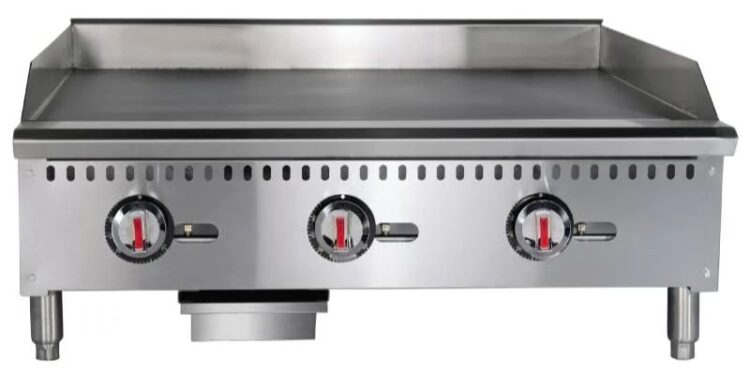A plancha grill, otherwise called a flattop grill, is a flexible cooking machine that offers a huge, level cooking surface for setting up various dishes. Due to its capacity to cook multiple ingredients simultaneously and produce consistent results, it is utilized extensively in commercial kitchens. The material that is used to build a plancha grill is one of the most important things to think about when choosing one. In this article, we will delve into “What Are the Popular Materials Used for Commercial Plancha Grills?”. Let’s get started!
What Are the Popular Materials Used for Commercial Plancha Grills?
Choosing the right material for your commercial plancha grill is crucial for optimal performance and longevity. Here are some popular materials commonly used:
Stainless Steel
- Highly durable and resistant to corrosion.
- Provides excellent heat distribution and retention.
- Easy to clean and maintain.
- Ideal for heavy-duty use in busy commercial kitchens.
- Recommended for professional chefs and establishments.
Cast Iron
- Offers superior heat retention and even heat distribution.
- Creates a natural non-stick surface with proper seasoning.
- Provides excellent searing and caramelization of food.
- Requires regular seasoning and maintenance to prevent rust.
- Well-suited for high-heat cooking and achieving a charred flavor.
Chrome-Plated Steel
- Provides a smooth cooking surface and even heat distribution.
- Resistant to rust and corrosion.
- Requires proper care to prevent scratching or chipping of the chrome coating.
- More affordable compared to stainless steel or cast iron options.
- Suitable for moderate use and budget-conscious establishments.
Carbon Steel
- Combines the benefits of cast iron and stainless steel.
- Offers excellent heat retention and distribution.
- Requires regular seasoning to maintain its non-stick properties.
- Lighter in weight compared to cast iron.
- Ideal for professional chefs and outdoor cooking enthusiasts.
Ceramic
- Provides exceptional heat retention and even heat distribution.
- Non-reactive material that won’t alter the flavor of food.
- Resistant to rust and corrosion.
- Delivers excellent searing and browning capabilities.
- Suitable for both indoor and outdoor use.
Titanium
- Offers excellent durability and corrosion resistance.
- Lightweight and easy to handle.
- Provides quick and even heat distribution.
- Non-reactive and safe for cooking acidic ingredients.
- Perfect for high-heat cooking and searing.
Copper
- Provides exceptional heat conductivity and responsiveness.
- Offers precise temperature control.
- Requires regular polishing and maintenance to prevent tarnishing.
- Ideal for delicate ingredients that require precise cooking.
Aluminum
- Lightweight and affordable option.
- Offers excellent heat conductivity.
- Prone to scratching and denting, requiring careful handling.
- Suitable for low to medium heat cooking.
Enamel-Coated
- Features a layer of enamel coating on a base material like cast iron or steel.
- Provides a non-stick cooking surface.
- Resistant to rust and easy to clean.
- Requires gentle handling to prevent chipping of the enamel coating.
Infrared
- Utilizes infrared technology to generate intense heat.
- Offers rapid heating and precise temperature control.
- Ideal for quick searing and cooking thin cuts of meat.
- Requires specialized knowledge for operation and maintenance.
FAQs About Commercial Plancha Grill Materials
FAQ 1: Which material is the most durable for a commercial plancha grill?
Stainless steel is renowned for its durability, making it an excellent choice for commercial plancha grills. It can withstand heavy use and is resistant to corrosion and rust.
FAQ 2: Can I use cast iron on a commercial plancha grill?
Yes, cast iron is a popular material used in commercial plancha grills. It offers exceptional heat retention and creates a natural non-stick surface with proper seasoning.
FAQ 3: Are there any maintenance requirements for stainless steel plancha grills?
While stainless steel plancha grills are relatively low maintenance, regular cleaning and occasional polishing can help maintain their appearance and performance.
FAQ 4: Can I use aluminum plancha grills for high-heat cooking?
Aluminum plancha grills are more suitable for low to medium heat cooking due to their lower heat conductivity. For high-heat cooking, materials like stainless steel or cast iron are recommended.
FAQ 5: Do ceramic plancha grills require any special care?
Ceramic plancha grills are generally easy to maintain. Regular cleaning with mild detergents and avoiding extreme temperature changes can help prolong their lifespan.
FAQ 6: What are the benefits of titanium plancha grills?
Titanium plancha grills offer excellent durability, lightweight construction, and quick heat distribution. They are ideal for high-heat cooking and searing.
Conclusion
Selecting the right material for your commercial plancha grill is a crucial decision that can impact the performance and longevity of the appliance. Stainless steel, cast iron, chrome-plated steel, carbon steel, ceramic, titanium, copper, aluminum, enamel-coated, and infrared are some of the popular materials used in commercial plancha grills. Each material offers unique advantages and maintenance requirements, so it’s essential to consider your specific needs and preferences.
Investing in a high-quality commercial plancha grill constructed from suitable materials will ensure consistent cooking results and enhance the overall dining experience for your customers.


canadian pharmacy sarasota: Canadian Md Pharm – canadianpharmacyworld com